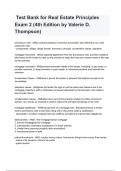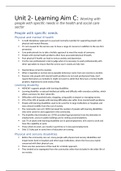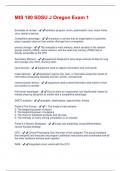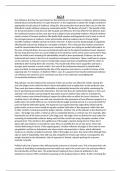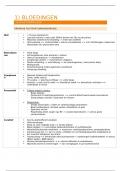Exam 2 (4th Edition by Valerie D.
Thompson)
promissory note - ANSa contract between a borrower and lender; also referred to as a real
estate lien note
- components: obligor, oblige (lender, borrower), principal, acceleration clause, signature
mortgage instrument - ANSa separate agreement from the promissory note, provides collateral
(the home) to the lender to back up the promise to repay the loan plus interest made in the note
by the borrower
mortgage covenants - ANSpromises borrower makes to the lender, including: to pay taxes, to
provide insurance, to keep premises in good repair, to otherwise preserve and maintain the
premises
Acceleration Clause - ANSused to permit the lender to demand that balance be paid in full
immediately
alienation clause - ANSgives the lender the right to call the entire loan balance due if the
mortgage property is sold or otherwise conveyed (alienated) by the borrower; also called a
due-on-sale clause
condemnation clause - ANSwhen all or part of the property is taken by action of eminent
domain, any money so received is used to reduce the principal remaining on the note
mortgage satisfaction - ANSFull payment of a mortgage loan. Standard practice is lender
returns promissory note to borrower along with a document called a satisfaction
- assumption, novation, estoppel (borrow reaffirms principle and interest rate obligations)
debt priorites - ANS1. first mortgage/senior mortgage
2. second mortgage/junior mortgage
3. subordination (voluntary acceptance of a lower priority)
4. chattel liens (personal property debt recordation)
5. foreclosure/power of sale
judicial foreclosure - ANS- surplus money action: foreclosure brings more money than owned
- notice of lis pendens: informs the public
- public auction
, - equity of redemption: privilege to redeem property anytime between the first sign of
delinquency and the moment of foreclosure sale
- deficiency judgment: statutory law providing borrower right to redeem property after sale
- strict foreclosure: absolute claim to title on default; no foreclosure process
deed of trust - ANSa three-party arrangement consisting of the borrower (trustor), the lender
(beneficiary), and a neutral third party (trustee) also known as a trust deed
- purpose is to provide security for the promissory note in place of a mortgage
- immediately grants and conveys title to trustee (naked title)
power of sale - ANSlender has power to foreclose and sell the property without going to court
entry and posession - ANSright of lender for default
deed in lieu of foreclosure - ANSvoluntary transfer of deed to avoid foreclosure proceedings
equitable mortgage - ANSa written agreement that, although it does not follow the form of a
regular mortgage, is considered by the courts to be one
security deed - ANSa warranty deed with a reconveyance clause (title returned to borrower
once loan is paid)
advantages of deed of trust - ANS1. if a borrower defaults, lender can take possession of
property and collect; process is still called foreclosure
2. the time between default and foreclosure is relatively short
3. the foreclosure process under power of sale provision takes less time, less expensive, and
less complex than court-ordered
4. the title is already in the name of the trustee
5. once the foreclosure sale takes place, there is usually no statutory redemption
term loan (straight loan) - ANSrequires only interest payments until the full amount borrowed is
due (similar to bond)
amortized loans - ANSregular payments for life of loan, each payment includes interest and
principal (PI)
budget mortgage - ANSlike an amortized loan but lender also collects 1/12th of estimated cost
of annual property taxes and hazard insurance on mortgaged property (referred to as escrow
(TI))
balloon loan - ANSany loan that has a final payment larger than any of the previous payments
loan to value (LTV) - ANSrelationship between amount of money a lender is willing to loan and
the lender's estimate market value of property

